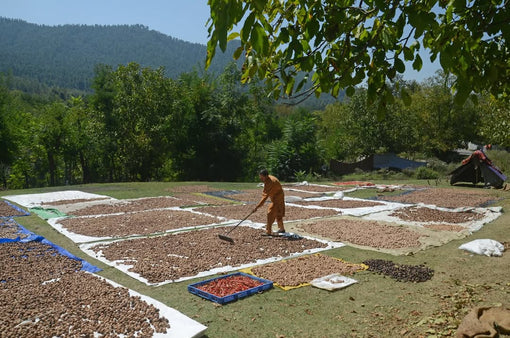
- Article published at:
- Article author: Hamiast Global
- Article comments count: 0
Drawer menu
Kashmir, known as paradise on earth, is not only famous for its breathtaking landscapes but also for its exquisite and flavorsome cuisine. Among the many culinary delights, the crown jewel is Wazwan, a royal multi-course feast that showcases the rich gastronomic heritage of the region. This elaborate meal, deeply rooted in Kashmiri culture, consists of an array of vegetarian and predominantly mutton-based delicacies, often prepared for special occasions such as weddings, gatherings, and festivals.
The roots of Wazwan trace back to the 14th century, when Mir Sayyid Ali Hamadani, a Persian Sufi saint, arrived in Kashmir with skilled artisans and cooks from Persia and Central Asia. These cooks introduced refined culinary techniques, which later blended with Kashmiri flavors to create the Wazwan tradition.
The influence of Persian, Turkish, and Mughal cuisines can be seen in the use of slow-cooking techniques, rich gravies, and aromatic spices like saffron, cardamom, and dried ginger.
"Waz" (واز) → Comes from Persian "آشپز" (Āshpaz), meaning cook or chef.
"Wan" (وان) → Likely derived from Persian "خوان" (Khwan), meaning a feast or banquet.
Thus, Wazwan literally means "The Feast of the Waz (Chef)
Preparing Wazwan is nothing short of an art form. The dishes are cooked overnight under the watchful eye of the head chef, called Vast Waza, in large copper vessels known as deg over traditional firewood stoves. The secret behind the exquisite taste of Wazwan lies in the meticulous selection of fresh, locally sourced spices and ingredients, including Kashmiri red chilies, Mawal (cockscomb flower), saffron, and dry fruits. The meat is hand-pounded to achieve the perfect texture, and the slow-cooking process enhances the flavors, making each dish a delicacy in its own right.
Wazwan is traditionally served in a large copper platter called Traem, shared by four diners. Before the meal, guests wash their hands using a Tash Naer, a traditional copper basin brought in by Wazas or close family members. The meal follows a structured sequence, beginning with appetizers and gradually leading to rich, aromatic curries. Each dish is served in a specific order, with an emphasis on communal dining and cultural etiquette.
A traditional Wazwan can include up to 36 dishes, each with its own distinct flavor and preparation method. Here are some of the most iconic ones:
Tabak Maaz consists of succulent lamb ribs that are first simmered in milk with a mix of spices until tender. The ribs are then deep-fried in ghee until they achieve a crispy, golden-brown texture. This dish is rich in flavor and is often one of the first to be served in a Wazwan.
Seekh Kebab is made from finely minced mutton, seasoned with Kashmiri spices, and molded onto skewers before being grilled over an open flame. These kebabs are juicy, smoky, and packed with flavor, making them a perfect starter.

Rista are soft, succulent mutton meatballs cooked in a rich, fiery red gravy made using Kashmiri red chilies and Mawal (cockscomb flower). The meatballs are made by hand-pounding the mutton to achieve a smooth, velvety texture. Each Traem traditionally contains four Ristas, one for each diner.
One of the most famous dishes of Wazwan, Rogan Josh is a mutton curry prepared with a generous amount of Kashmiri red chilies, giving it its signature deep-red hue. The meat is slow-cooked in aromatic spices and yogurt, resulting in a flavorful and tender dish.

Methi Maaz is a delicacy made with lamb stomach and flavored with fenugreek leaves (methi). The bitter and aromatic fenugreek blends with the rich spices and slow-cooked meat, creating a distinct and flavorful dish.

Palak Korma is a rich mutton dish cooked with spinach and infused with a blend of Kashmiri spices. The spinach imparts a silky texture and a mild, earthy taste that perfectly complements the tender meat.
Yakhni is a mild, yogurt-based mutton stew flavored with bay leaves, cardamoms, and cloves. Unlike many other Wazwan dishes, Yakhni is not spicy but has a subtle, aromatic flavor that makes it a soothing addition to the meal.
Gushtaba is the grand finale of the Wazwan feast. This dish consists of hand-pounded minced mutton balls cooked in a creamy yogurt-based gravy. It is similar to Rista but less spicy and has a rich, velvety texture. The dish is considered a mark of honor and is served at the very end of the meal.

Aab Gosh is a mild, aromatic dish in which lamb ribs are slow-cooked in milk, saffron, and cardamoms. The result is a delicate and subtly flavored dish that contrasts beautifully with the spicier dishes of Wazwan.
Waza Chamman is a vegetarian delight made with deep-fried paneer (chamman) cooked in a rich, spiced tomato-based gravy. It provides a delicious alternative for those who prefer vegetarian options in Wazwan.
Along with these main dishes, Wazwan is served with traditional accompaniments such as walnut chutney, pickles, and curd. The meal concludes with Phirni, a creamy dessert made from semolina and milk, garnished with saffron and dry fruits. This sweet, fragrant dish serves as the perfect end to the royal feast.
Traditionally reserved for weddings and grand feasts, Wazwan has now gained worldwide recognition. Today, many high-end restaurants and specialty Kashmiri cuisine outlets serve Wazwan, allowing food enthusiasts across the globe to experience this royal feast. With Kashmiri diaspora and food lovers promoting its authenticity, Wazwan continues to grow in popularity beyond the valley.
For anyone who has ever tasted Wazwan, the experience remains unforgettable. The sheer artistry, heritage, and communal spirit that define this feast make it an essential part of Kashmiri identity. If you ever get the opportunity to savor a traditional Wazwan, don’t hesitate—it’s an experience that will transport you straight to the heart of Kashmir’s rich culinary heritage.
Want to relish authentic Kashmiri Wazwan? Order now and bring home the taste of royalty!